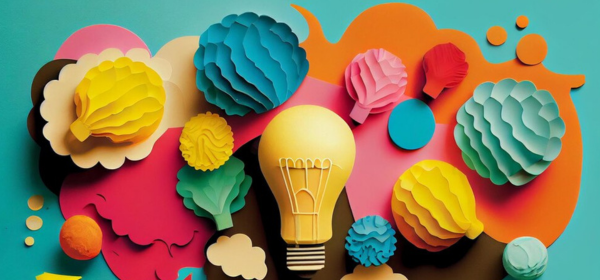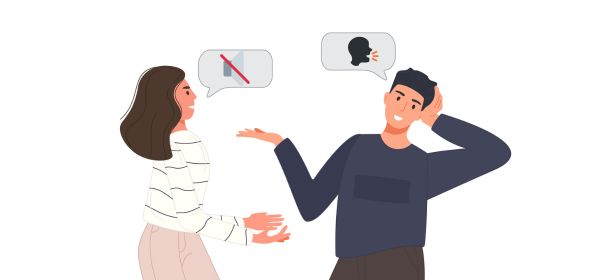Meeting with Veranita Yosephine
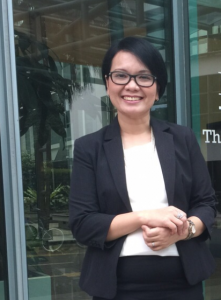 Veranita Yosephine is Sales Development Director Danone Aqua Indonesia. She also pilots the He For She action in Indonesia with Ditmar Koster, CEO of PT Nutricia Indonesia Sejahtera. Ditmar has also been her mentor for 2.5 years and their professional relationship is a kind of « model » of constructive cooperation.
Veranita Yosephine is Sales Development Director Danone Aqua Indonesia. She also pilots the He For She action in Indonesia with Ditmar Koster, CEO of PT Nutricia Indonesia Sejahtera. Ditmar has also been her mentor for 2.5 years and their professional relationship is a kind of « model » of constructive cooperation.
Testimony about gender issues in Asia, female leadership, commitment from men to gender equality…
Eve le blog : You are Sales Development Director Danone Aqua Indonesia. Would you briefly trace the path that brought you to this function?
Veranita Yosephine : Basically I grow up professionally in Danone – all 9 years in AQUA (Danone Waters Indonesia). I came to work for Danone 9 years ago, taking a junior role as Sales Channel Manager. After 1.5 years, I was promoted to become National Field Sales Senior Manager and 2 years after I was promoted to become Regional Sales Director – in charge of 1/3 of company sales, circa 150 mn Eur turnover.
In 2012, I went for exposure in Supply Chain function, taking Supply Chain Collaboration Director position. It’s an experience I had to build a new function from scratch in Supply Chain and to recruit, shape and develop a new team. Subsequently I moved back to sales function in 2014 taking my position today as Sales Development Director. I am the only woman on senior leadership positions in my sales division – an organisation that is 90% men.
Along that 9 years track, I got married, gave birth to 2 sons and took 5 months sabbatical leave in 2010 to pursue a graduate business program in US and Japan under full scholarship of Fujitsu Corporations – a leading Japanese technology firm. I came back to Danone right after the study. Today, in parallel to working in Danone, I am taking Global Executive MBA program at INSEAD in Singapore.
In a nutshell, I am a woman, a wife, a mother, a Danoner and an MBA candidate – all together.
Eve le blog : On the Eve blog, we focus on gender equality in the workplace and female leadership. Can you describe the situation in Indonesia and explain what are the major challenges in this field for your country?
Veranita Yosephine : I view challenges for women in the workplace for Indonesia on below 3 areas :
1. Women face unfavorable cultural barriers
On top of all challenges faced by women in business in western countries, Asian women have been held back for centuries by culture – Indonesian women are of no exception.
In Indonesia, I was – together with more than 120 million other women in the country – born, raised, educated and have lived in a patriarchy culture which basically tells all the women to put forward men and their objectives beyond women’s. To stand out, to raise voices, to lead and to take bold steps as a woman are not socially expected – let alone appreciated.
My personal experience is an example. I come from a Batak tribe in North Sumatera island with a social system that traditionally permits a husband to divorce his wife or to marry another woman if his wife is not able to give him a biological son and that all family wealth should be passed onto only sons. The system is built to position only men to pass on family name and legacy to next generations. I grew up surrounded by social values and common beliefs that leadership roles belong to men – that women should stay at home to look after family while men go out for work and lead social groups.
Not only limiting opportunities for women, this value system adversely affects also their confidence. In my young age, it was normal for me to see Batak parents proudly sharing their sons’ academic achievements during family gatherings while very limited visibility was made for the same accomplishments of the daughters – for which daughters were told to keep their voice low.
Of no surprise, the women growing up in the society were lacking self-esteem and in many areas this situation still exists until today.
Lack of self-confidence and challenged by social expectations that demand women to be primarily responsible of domestic works, including nurturing harmony, women in Indonesia will find it challenging to succeed in the workplace – let alone to take leadership positions. Aggressive, too ambitious and pushy are some images easily attributed to women who stand for bold decisions and drive actions. Men can do the same thing and be positively credited as : having strong leadership.
2. Companies need to establish more policies to support women
Years of conversations around gender equality at workplace are still confronted with work policies that are not yet fully supporting women. For example, not all companies have nursing and child care facilities and very few companies have flexible hours or work-from-home policies that help women acquire greater balance between family and work. Only very few companies also have special training programs for women. I am grateful to be in Danone where many initiatives have been put in place to support women.
I believe it’s crucial for companies to design and implement policies that allow women to access capabilities and resources to play at equal levels with their male counterparts. Without adjustments in work policies, women will always find it very difficult to balance their domestic responsibility and professional ambitions.
3. Women lack of female role models
Of more than 120 million women in the country, only few Indonesian women reach top positions in business. For example, in Danone Indonesia 4 CBUs, half of entry level positions are occupied by women with 70% of the new born talents graduating from Management Trainee program are women. However, women marked less than 20% presence on top management positions.
This situation makes it more challenging for younger women to find role models and inspirations as it is for men. Lack of female at top positions is part of reasons of why it’s fundamentally important to engage male participations – which is the heart of HeForShe movement.
Eve le blog : You have initiated the first HeForShe Community in Indonesia and in the whole Danone Group. Why do you find this movement especially promising?
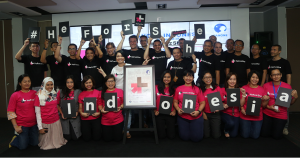 Veranita Yosephine : I believe in possibilities of people and I believe that in Danone things are possible. In Danone Indonesia – 4 CBUs, HeForShe aims at engaging male Danoners to support career advancement and personal growth of their female colleagues. Inspired by my mentoring experience with Ditmar Koster, HeForShe starts with Cross-Gender-Cross-CBU mentoring program which will subsequently be followed by training, career counseling and peer coaching platforms.
Veranita Yosephine : I believe in possibilities of people and I believe that in Danone things are possible. In Danone Indonesia – 4 CBUs, HeForShe aims at engaging male Danoners to support career advancement and personal growth of their female colleagues. Inspired by my mentoring experience with Ditmar Koster, HeForShe starts with Cross-Gender-Cross-CBU mentoring program which will subsequently be followed by training, career counseling and peer coaching platforms.
I find the movement promising for below reasons :
1. HeForShe is a voluntary movement, and so many people in Danone have committed for supports.
Today – 3 months after I came up with HeForShe idea – more than 80 female managers across 4 CBUs have joined the community, 15 male CODI members have signed up to become champions and more than 20 male senior managers applied to become mentors.
Senior Danone leaders in Indonesia as well as in Asia Pacific region stand up to become sponsors : Ditmar Koster (GM Nutricia Indonesia Sejahtera – ELN), Charlie Cappetti (GM AQUA – Danone Waters Indonesia), Olivier Pierredon (GM Sarihusada – ELN), Elamaran Kundram (Country Manager – Nutricia Medical Nutrition), Dariusz Kucz (VP Asia Pacific ELN), Floris Wesseling (VP Asia Pacific Waters), Joan Sintes Sanz (VP Asia Pacific Human Resources), including Bernard Ducros (GM Dairy Russia, former VP Asia Pacific Waters). All have put their commitment behind HeForShe.
It’s an amazing experience to gather such scale of supports in a short period of time. HeForShe is not an HR program, there is no direction set at corporate level and everything is built bottom up – all by Danoners across genders, CBUs, nationalities and seniority levels.
We launched HeForShe on September 23rd, and by the end of October we will complete engagement process of 30 male-mentor- female-mentee pairs and start the mentoring program.
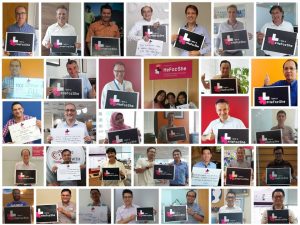 2. Danone has strong culture and commitment towards talent development and diversity.
2. Danone has strong culture and commitment towards talent development and diversity.
I find it natural to drive actions for HeForShe in Danone as diversity and talent development are already part of company culture. HR team across divisions responded very fast to provide supports and access to resources. HR Asia Pacific teams are behind every stage of development of the HeForShe programs. I work closely with Ellen Ruan (Talent Director Asia Pacific), Ary Gemini (Learning Director Asia Pacific) and their team to structure HeForShe programs and synchronise with existing learning platforms in Danone.
3. HeForShe is a global platform championed by United Nations
Being part of worldwide movement helps our mission reach large number of people faster. It helps us generate awareness and amplify our energy at scale that makes it easier for us to mobilize people and resources. In next few months, I hope to that we can settle official partnership between Danone Indonesia and UN Women Asia Pacific to take full benefit of HeForShe platform.
We hope our movement can also be leveraged in other Danone companies as well as in other countries.
Eve le blog : You pilot the He For She action in Indonesia with Ditmar Koster, CEO of PT Nutricia Indonesia Sejahtera (NIS). Ditmar has also been your mentor for 2,5 years. Tell us about this relationship. What does it bring to you and to him?
Veranita Yosephine : I started my mentoring with Ditmar in April 2013 as part of Danone NewGen training program. Until today, we have spent 30 mentoring sessions held back-to-back in the past 30 months. Ditmar always opens his door for me to see him – no matter how busy he is as CEO of a Danone company.
Gaining self-awareness and full control of myself was the first important lesson I learned from Ditmar. After moving across 3 functional divisions in AQUA and going through process of international assignment for a new role – a plan which was later cancelled – I felt entirely confused of my career path and unclear about my personal development. I later began to be emotional about many things at work and to lose sights on my priorities. I remember Ditmar once called me ‘a dynamite with a short fuse’ to illustrate how quickly I was to explode emotionally under pressures and how it negatively affected people around me.
Ditmar helped me acquire capacity to step back and do self-reflections. He taught me to be sensitive to others and to stay composed under pressures – skills that are instrumental in becoming an effective leader.
Ditmar also helped me build confidence to make courageous decisions, to take clear positions in ambiguous settings and to lead people in complex environment. Capacity that I see naturally developed in his strong caucasian male profile, but I have to fight to build in my conservative Asian female background.
Ditmar helped me craft different paths towards a different future, one I might not be able to achieve, had he not been my mentor.
For many years, I always wanted to go for an MBA program, and INSEAD has always been my dream. Seven years ago, I packed a bag and flew from Jakarta to INSEAD Fontainebleau campus in France only to experience in-class interactions as a guest-observer. I always wanted to go to INSEAD but for many reasons, primarily work-family-life consequences, I couldn’t manage to make decision to go. I also didn’t feel confident to apply to the program over my lack of international experience that is key to Executive MBA admissions at INSEAD.
Ditmar stood strong for me all the way and I hung onto him for strength throughout the entire journey. He texted me a message before I departed to Singapore for admittance tests that said ’’Veranita, make Indonesia proud, make me proud !‘’. Ditmar was the last and the first person I contacted before and after selection rounds. He helped me gain confidence I had wished to accumulate for years.
’’Knowing that someone believes in you
can make you feel stronger than you probably are' ».
I finally got accepted to INSEAD, as the only Indonesian in cohort of 67 people of more than 20 nationalities and as the first Indonesian female admitted in past 13 years. I also received 2 scholarships from INSEAD. I truly admire Ditmar’s authentic interests and relentless commitment to support me even though until today I never work for him.
The experience taught me how a helping hand can change someone’s life and can create access to possibilities that otherwise won’t exist. I hope my mentoring experience bring positive impact to Ditmar as much as it does to me.
Ditmar is my reference of HeForShe. I initiated HeForShe hoping to inspire many other men to share Ditmar’s path, to help many other female talents in Danone as well as in other businesses and to remind all women – especially in Indonesia – for their rights to stand out and to believe in possibilities.
Eve le blog : Finally, do you have a message for women and men who want to commit for gender equality?
Veranita Yosephine : For the women : Be brave – we are all in this journey together and I really hope you can find your great mentors (either male/female) to help you walk down the path and navigate in the stormy water.For the men : Thank you and I am really proud to share this path with you, together we will create a better future for both men and women as we stand for equal opportunities.
Interview conducted by Valérie Amalou (Danone), with the help of Marie Donzel, for Eve le blog.




